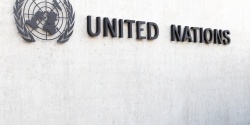Published: 06.09.2022

· On 2 September 2022, the 99th plenary meeting of the United Nations General Assembly approved the 'International Cooperation on Access to Justice, Remedies and Assistance for Survivors of Sexual Violence', which promotes abortion, reproductive rights and gender-based language.
· Only Nigeria, supported by more than thirty delegations mainly from Africa and the Middle East, called for changes to the language on sexual and reproductive health and rights that would allow abortion.
· The negotiators stated that the proposed amendments address issues agreed upon by consensus, despite the fact that there is no international consensus on abortion.
· Poland supported the resolution from the outset, raising no questions about the qualification of abortion as a human right, nor supporting the amendments.
· A few days before the vote, the Institute of Legal Culture Ordo Iuris had written a letter to the President of Poland and the Permanent Representative of Poland to the United Nations, asking them to oppose the resolution, as it lacks of international consensus and will give further mandates to UN agencies to promote abortion.
During the most recent plenary meeting of the United Nations General Assembly, held on 2 September 2022, the resolution 'International Cooperation in Access to Justice, Remedies and Assistance for Survivors of Sexual Violence' was debated and voted on, calling on States to urgently ensure the promotion and protection of 'sexual and reproductive rights' and 'safe abortion'. The language used in the resolution treats abortion as a human right, despite the fact that there is no international consensus on the subject and no internationally binding document recognising it as such.
The resolution also disregards and reinterpreted the findings of the 1994 International Conference on Population and Development (ICPD), held in Cairo, which state (para. 8.25) that abortion cannot be promoted as a method of family planning and that governments should help women avoid abortion.
During the debate, Nigeria led a group of over thirty countries that opposed the controversial contents of the text by submitting four amendments to the drafting. The amendments aimed to achieve consensus and greater balance by removing the controversial definitions of the text. The Nigerian delegation emphasised that abortion is a political issue and not a human right, stressing that the language used by the negotiators was not agreed upon by consensus, as the delegations of Japan and Sierra Leone responded. On the other hand, Malaysia denounced the non-transparent conduct of the negotiations as 'there was no genuine interest in finding a common denominator to address the issue', concluding that 'it is irresponsible to claim that such terminology, adopted without a vote, constitutes consensus language'.
The Permanent Representative of the Czech Republic, on behalf of European Union Member States, including Poland, after welcoming the drafting, specified that "the resolution outlines a number of concrete actions that Member States should implement to establish effective accountability and assistance mechanisms, both at national and international level". Furthermore, the Representative reaffirmed the EU's commitment "to the promotion, protection and fulfilment of the right of everyone to have full control and to decide freely and responsibly on matters relating to their sexuality and their sexual and reproductive health, without discrimination, coercion or violence. The EU also emphasises the need for universal access to quality and affordable information on sexual and reproductive health, education, including comprehensive sexuality education, and health care services”.
During the vote on the amendments proposed by Nigeria, Poland did not manifest any support to them, aligning its position with that expressed by the European Union on behalf of its Member States, even if the Permanent Representative of Poland in the United Nations had been made aware of the contents of the resolutions, which are dangerous for the defence of fundamental rights in Poland and to our State's ability to continue to decide its own policies on the protection of fundamental human rights such as the right to life.
‘The political pressure with which the language of this resolution has been imposed by one group of States on others - overriding the search for a shared consensus to produce an effective document in assisting victims of violence - represents a missed opportunity for Poland to defend its domestic laws, its sovereignty in deciding how to regulate abortion, but above all a missed opportunity to defend, along with many other delegations, unborn human life, denouncing and stopping illegitimate pressures to propagandise the abortion industry, affirming that unborn children cannot be excluded from the right to life under international law. Furthermore, the silence of Poland, as well as Hungary, in taking a position in the international arena, represented a failure to realise the commitment made in the Geneva Consensus Declaration to defend fundamental rights and to fight to restore the true meaning of the concept of human rights’ – said Veronica Turetta, analyst of Ordo Iuris Center for International Law.

19.05.2025
• The 78th World Health Assembly, the deliberative body of the World Health Organization, begins today in Geneva.

During Holy Week, when we remembered the martyrdom of Jesus, many Poles heard about the innocent death of 9-month-old Felek (such an altered name was given to him by Gazeta Wyborcza journalists). Potassium chloride – a substance used to carry out death sentences – was injected into the heart of the boy who was due to be born any day.

• Gazeta Wyborcza published an article titled "Ordo Iuris Wants the Constitutional Court to Delete the Premise of Endangering a Woman’s Health. Prof.

17.04.2025
• The Ordo Iuris Institute has prepared an opinion for the UN as part of a thematic report on surrogacy and its impact on the rights of women and children.